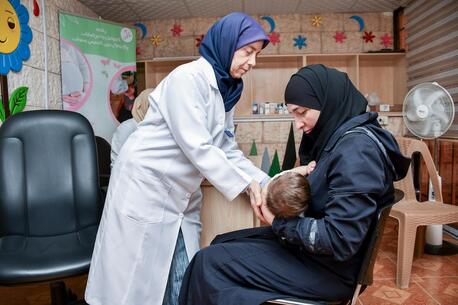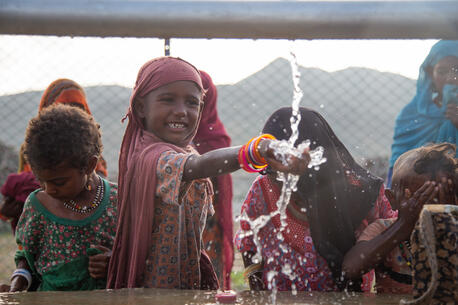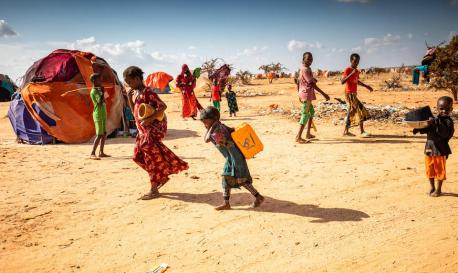
Impacts of Conflict and Climate Change Fueling Crisis in Ethiopia
UNICEF Emergency Director Manuel Fontaine stresses the need for a scaled-up response to Ethiopia's 'double emergency' to tackle a child malnutrition crisis and help families rebuild.
In Afar, Ethiopia, severe drought is just one factor contributing to rising rates of child malnutrition. The region is also still reeling from the devastating effects of conflict, an extension of the violence that began in neighboring Tigray in November 2020.
UNICEF Emergency Director Manuel Fontaine recently visited Afar while in Ethiopia to survey the rapidly deteriorating humanitarian situation there — one that is playing out all across the Horn of Africa, where an estimated 10 million people are in urgent need of humanitarian aid.
A major issue in Afar, Fontaine points out, is that 70 percent of health facilities in the region have been damaged or destroyed by fighting, significantly hampering efforts to cope with rising needs amid a global food crisis magnified by the war in Ukraine.
UNICEF's call for support to help Ethiopia cope with a 'double emergency'
The crisis in Ethiopia illustrates the far-reaching impacts of climate change on children, as Fontaine explains: "When there is a drought, families have to move. They have to search for water, for themselves, for their cattle, their goats and try to find their livelihoods somewhere else. Children are displaced. They drop out of school. They get sick [with] diarrhea, malnutrition. So it's a whole range of issues that is going to affect their survival, but also affect their future, their education."

© UNICEF/UN0677463/Bizuwerk
Above, Fontaine visits with 1-year-old Ukubi who is being treated for severe acute malnutrition — and recovering well — with UNICEF's support at Asayita hospital in Afar, Ethiopia. Treatment with Ready-to-Use Therapeutic Food is highly effective — as long children receive it in time.

© UNICEF/UN0639228/Sewunet
UNICEF is providing a range of emergency relief services to families displaced by drought. Above, 13-year-old Keria, left, and a friend draw safe water from a UNICEF-supported water point at an IDP camp in Guyah, Afar region. Below, Fontaine, standing in the back, center, drops by a UNICEF Child-Friendly Space at the Agatina IDP site during a lesson with teacher Tsegaye Woldegebriel. Setting up safe play spaces and temporary classrooms and providing learning materials to displaced children to ensure continued access to education are all important aspects of UNICEF's ongoing emergency response in the country.

© UNICEF/UN0677464/Bizuwerk
Advancing creative solutions to mitigate children's suffering
UNICEF is calling for more support from partners and donors — support that is needed to meet immediate needs and to advance long-term solutions to the crisis in Ethiopia. In Kori, Afar, for example, UNICEF and partners have installed deep water wells powered by solar panels to improve access to the essential resource and bring stability to the community. With a more sustainable system now in place in Kori, Fontaine said, "Children can go to school, and that whole vicious cycle of climate change and impact on education, survival and protection of children is being broken."
Many families across the Horn of Africa region are leaving everything behind as they search for food and water, and children’s lives have been destabilized as a result. Without timely intervention, the situation will get worse. Urgent action is needed to make sure that millions of at-risk children get the future they deserve. Help UNICEF deliver for children impacted by severe drought in Ethiopia and all across the Horn of Africa. Donate today.
HOW TO HELP
There are many ways to make a difference
War, famine, poverty, natural disasters — threats to the world's children keep coming. But UNICEF won't stop working to keep children healthy and safe.
UNICEF works in over 190 countries and territories — more places than any other children's organization. UNICEF has the world's largest humanitarian warehouse and, when disaster strikes, can get supplies almost anywhere within 72 hours. Constantly innovating, always advocating for a better world for children, UNICEF works to ensure that every child can grow up healthy, educated, protected and respected.
Would you like to help give all children the opportunity to reach their full potential? There are many ways to get involved.





